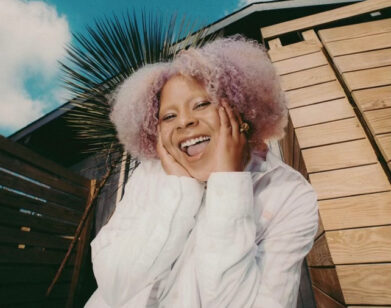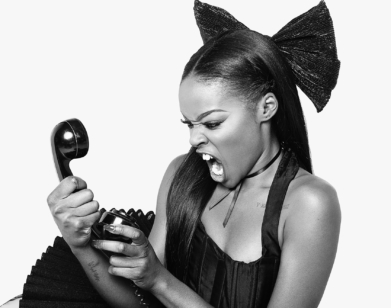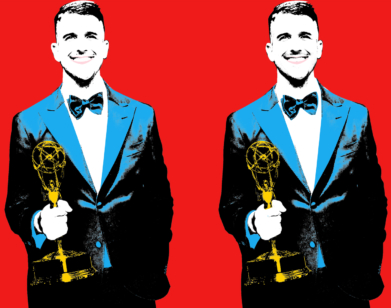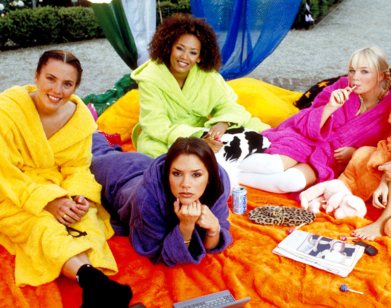New Again: Spice Girls
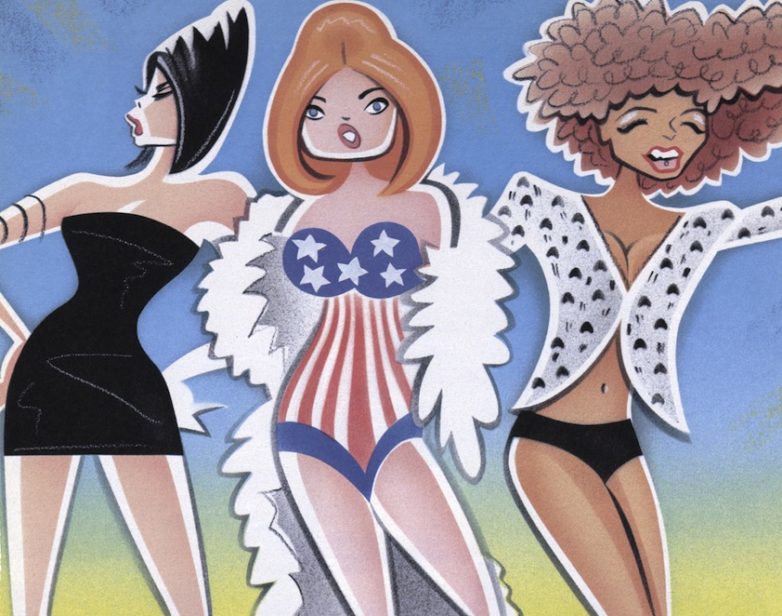
If you were a girl growing up in the late ’90s, most likely few things were more important to you than the Spice Girls. When the “Girl Power” epidemic swept America, the group’s most controversial member was Geri Halliwell, a.k.a. Ginger Spice. Never afraid to flaunt her “assets” in skimpy, skintight, Union Jack-emblazoned numbers, Halliwell always had a surplus of spice in her life. When the Spice Girls disbanded in 2000—she was the first to abandon the iconic girl group—Halliwell embarked on a solo career. Her first album, Schizophonic (1999) outsold the last Spice Girls record, but subsequent attempts were less successful. Though she did have a hit in the early 2000s with her cover of campy classic “It’s Raining Men.”
Now 41 years old, Halliwell is staging a comeback. Her first order of business was to premiere a music video so bizarre we’re not sure whether to cringe, laugh, or commit the dance routine to memory. The freaky lovechild of a Miley Cyrus performance and a Jimmy Kimmel YouTube prank, the video for “Half of Me” depicts the artist formerly known as Ginger Spice twerking with furry friends and dancing with shirtless men. It also features the most eclectic group of music video extras the world has ever seen.
Still, a Spice Girl comeback is never a bad thing. In honor of Halliwell’s triumphant return to music, we uncovered this nostalgia-inducing interview from February 1998 for which Halliwell, Victoria Beckham (then Victoria Adams), Mel B, Emma Bunton and Mel C passed a cell phone around the back of a limousine. Unfortunately, there is no record of how laughably humongous the cell phone is or what they are wearing.
———
The Spice Age
By Jonathan Bernstein
Hard to believe it’s been only a year since Posh, Ginger, Scary, Baby, and Sporty entered our lives… but such is the power of the instant pop phenomenon
Since the release of “Wannabe” in January 1996, the quintet has become an anomaly in the history of teenybop sensations. The first all-girl pop group with an (almost) all-girl audience, the Spice Girls are nothing if not perpetually mindful of the emotional well-being of their core constituency. Like shrill, raucous, stack-heeled Girl Scout leaders, they are engaged in the task of reinforcing their admirers’ self-esteem.
However, the endless exclamations of their catch-all credo—”Girl Power!”—has had an adverse effect on much of the press, which has recoiled from what it regards as the group’s shrieking unsophistication, skimpy allocation of talent, and rampant materialism. At a time when female artists command more attention than ever, it’s considered acceptable for narcissists to identify with Courtney Love, nihilists with PJ Harvey, neurotics with Fiona Apple, and numbskulls with Jewel. But it’s not, apparently, OK for kids to like the Spice Girls.
In effect, the same people who willingly suspended disbelief when asked to accept the newest young starlet, prodigious musician, gifted designer, white-hot model, or genius director, decided that when it came to the Spice Girls, the hype machine wasn’t going to sucker them in. That kind of blinkered rejection makes the group’s detractors even bigger suckers. In the time squandered predicting the Girls’ demise, celebrating their rumored internal friction, prematurely cremating their very much alive Spiceworld album, and anticipating dismal failure for their January movie of the same name, knee-jerk Spice death squads have missed out on a handful of exhilarating records and the exploits of one of the most unaffected, least-manipulated puppet pop groups of all time.
The Spice bubble is bound to burst soon. But as I reflected during an interview with the five members (who were passing a cell phone around in the back of a limo), we’re going to miss them when they’re gone.
JONATHAN BERNSTEIN: America has been very resistant to pop music for the better part of this decade. Are you surprised you were accepted so rapidly?
VICTORIA ADAMS (POSH): We were successful in Britain and Europe, but we came to America with the attitude that this was a completely different country, a huge country, and we were going to have to start from scratch. We didn’t come over thinking we were a big success, because no one had a clue who we were. We just treated the country with the respect it deserves. America is so important to us.
BERNSTEIN: Do you wish you had more fans your own age?
ADAMS: We do have fans our own age. We get fan mail from single mothers. Obviously, we get a lot of four-year-old kids as well, but that’s a huge compliment because a four-year-old will give an honest and uncorrupted opinion.
BERNSTEIN: Did anyone make you scream when you were the same age as the kids who scream for you now?
MELANIE BROWN (SCARY): Not really, no. I was a bit of a hard nut, I think. I was scary even then.
EMMA BUNTON (BABY): I went through a tiny phase with Bros.
GERI HALLIWELL (GINGER): I loved Wham!, but I wasn’t a screamer. I was a starer, silent but gawping.
MELANIE CHISHOLM (SPORTY): I’ve never been a superfan, but I’ve admired people. I still idolize Madonna, and I really loved Wham!, but I never waited outside in the rain for anyone.
BERNSTEIN: Does it confuse you when people wait outside in the rain for you?
BROWN: It does a bit, but you disassociate yourself from it. It’s like they’re screaming at the Spice Girls thing, not at you. Or you think, They’re just screaming for the others, they’re not bothered about me.
BERNSTEIN: You’ve been criticized for putting your name on an entire department store’s worth of products.
ADAMS: You’ve got five different personalities here, that’s why we do so many. We’re proud of all the sponsorships we do. People like to slate us for it, but if we were a racing team, they wouldn’t question it.
BERNSTEIN: You must get free designer wear by the ton, Miss Posh.
ADAMS: Don’t you believe it. We get free Pepsi and chips, but I don’t get free Gucci or Prada.
BERNSTEIN: What’s your biggest pop star extravagance?
BROWN: I’m not really flashy. The things I treasure most are my tattoos. And my gold tooth.
BUNTON: I’m not going to tell you. You’d just think, Oh no, she is a pop star wanker.
BERNSTEIN: What’s the biggest misconception about you?
HALLIWELL: It’s all true… No, it’s not.
BERNSTEIN: Stick with that. That’s a good comeback.
HALLIWELL: Of course there’s more to me than what gets written, but at the end of the day it’s very hard for the media, as a male-dominated industry, to digest the fact that a girl with a pair of big boobs has got a brain. They try to be very ’90s about it, but when they write their articles that’s what they’re subconsciously saying.
BERNSTEIN: You did separate magazine covers in Britain a few months ago. Was that to pave the way for solo Spice Girl careers?
HALLIWELL: We’re all very creative people and want to express ourselves as individuals. So if one wants to go be a bricklayer for a month, we’ll support that person. That’s what Girl Power is about. We’ll be a team no matter what.
BERNSTEIN: Say a few years down the line, someone wants to make a Spice Girls biopic. Who would you want to pay you?
BUNTON: I’d like to play myself if I could. Otherwise Goldie Hawn would be fantastic.
CHISHOLM: I’d get Madonna to play me. Think she’d be up for it?
HALLIWELL: The person I’d like to play me isn’t alive anymore: Vivien Leigh. She was a bit bonkers as well.
BERNSTEIN: You were probably a little starstruck when you started out, but what has been your favorite celebrity encounter?
BUNTON: I still get really starstruck. I’m terrible. I go bright red! We met Brad Pitt the other day and I was a complete wreck. We met Madonna at the MTV Video Music Awards, which was amazing. All of us have been fans at some point, so to meet her, to sit down and actually speak to her was just—wow! She said she loved our first album—her favorite song on it was “Mama”—and she hoped her little girl would be a fan.
BERNSTEIN: Britain’s been awash in teenybop boy bands for ages, but there haven’t been many girl groups forming in your wake.
HALLIWELL: That’s not good. There should be more. In America I counted over 30 black female R&B groups, but in Britain there are very few. It’s easier for boy groups. They can rely on their abdominal muscles to sell records. People say we rely on short skirts and Wonderbras, but I don’t think we do. Ninety-five percent of our listeners are girls.
BERNSTEIN: Do you think you’re overexposed?
HALLIWELL: [draws the word out with theatrical relish] O-v-e-r-e-x-p-o-s-e-d? I don’t think so. What’s overexposure? It’s all relative, and the ’90s are about saturation. It’s supply and demand. We’re only giving as much as people want. As far as the merchandise goes, we do have a responsibility, because there are loads of people ripping the kids off with cheap merchandise, like selling dolls whose heads fall off.
BERNSTEIN: You girls have been together forever. You lived as a group for three years before you made it, and now you’re in each other’s company 24 hours a day. Other groups would be traveling in separate limos by now.
BROWN: No, no, this is the whole point. This is one of our messages: female solidarity. There’s nothing like hanging out with your girlfriends. We’re literally a girl gang.
BERNSTEIN: But even girl gangs take breaks from each other. Don’t you ever long for a holiday from being a Spice Girl?
HALLIWELL: It’s scary, because even on our time off we’re arranging to get together. Sometimes we’re very fatalistic about life. The five of us have been placed by destiny to be together. We’ve found each other, and it doesn’t feel right when we’re apart. As mad as it sounds, I feel weird when I’m not with them.
BERNSTEIN: Do you think you’ll still be together when the fame is over?
CHISHOLM: Most definitely. We’re a band, but we started off as friends and we’ll end up as friends. We all want to be each other’s kids’ godparents!
BERNSTEIN: Then in 20 years’ time, it’ll be Spice Girls: The Reunion!
HALLIWELL: We could do it when we’re 60, when we’re bopping around like supergrans. Granny Power! Vitality when you’re seventy!
BERNSTEIN: OK, that’s it. Thanks, mate.
HALLIWELL: Thanks for not being a cynical journalist. Remember, when you write this article or any other article: You are society. You have a responsibility.
THIS INTERVIEW ORIGINALLY RAN IN THE FEBRUARY 1998 ISSUE OF INTERVIEW.
New Again runs every Wednesday. For more, click here.

